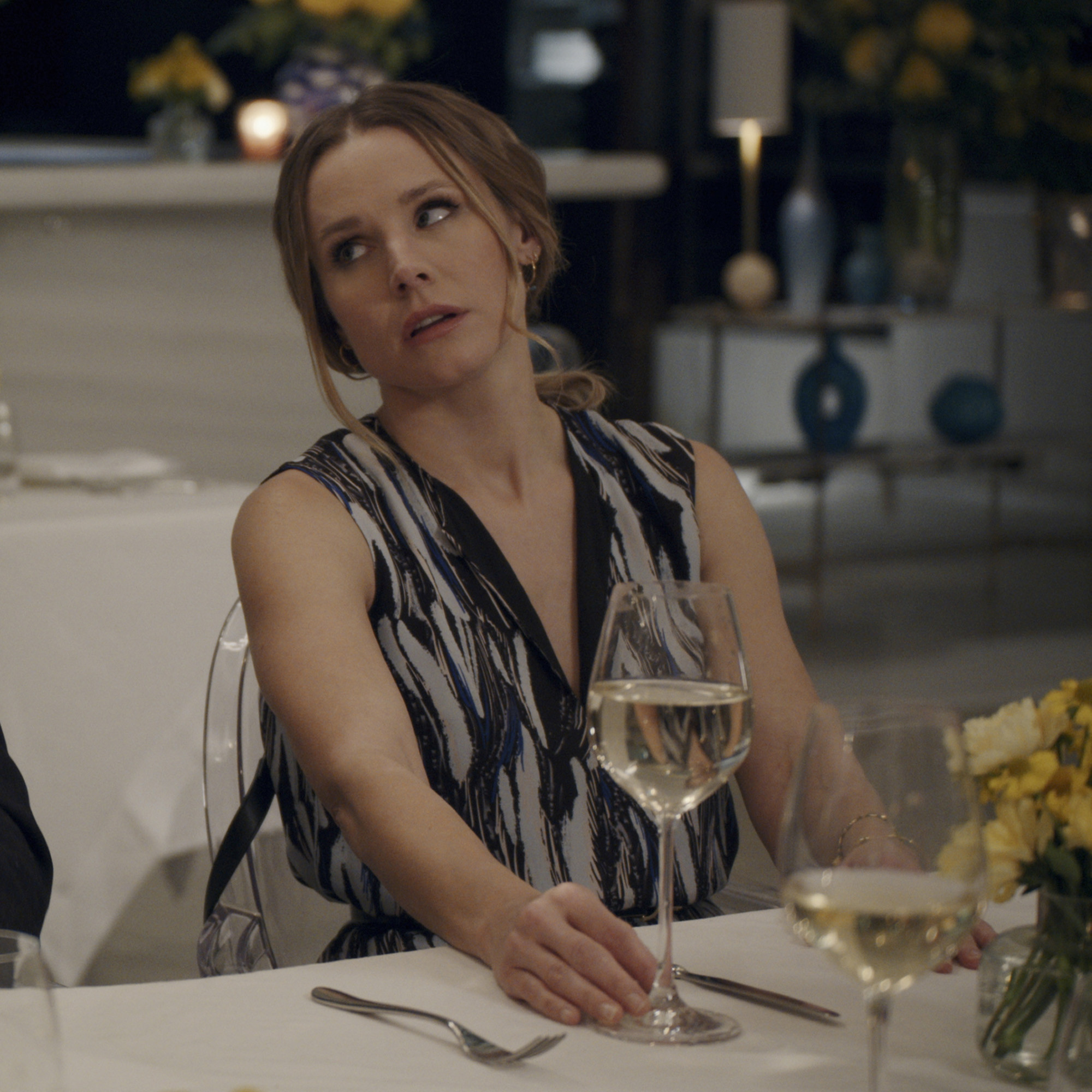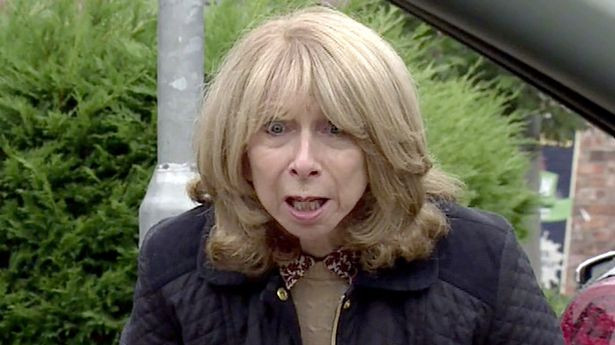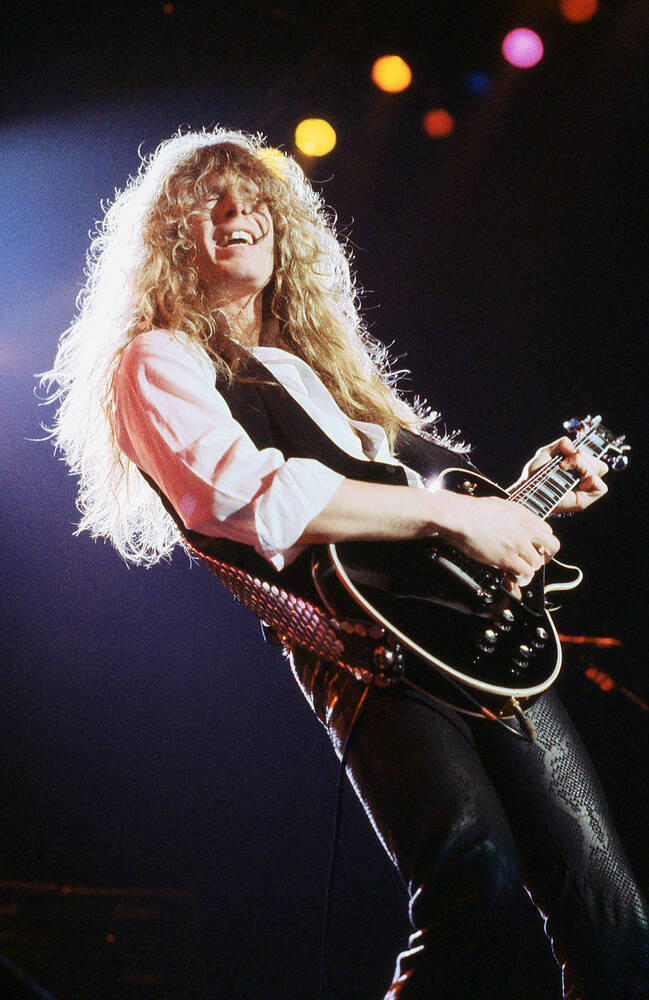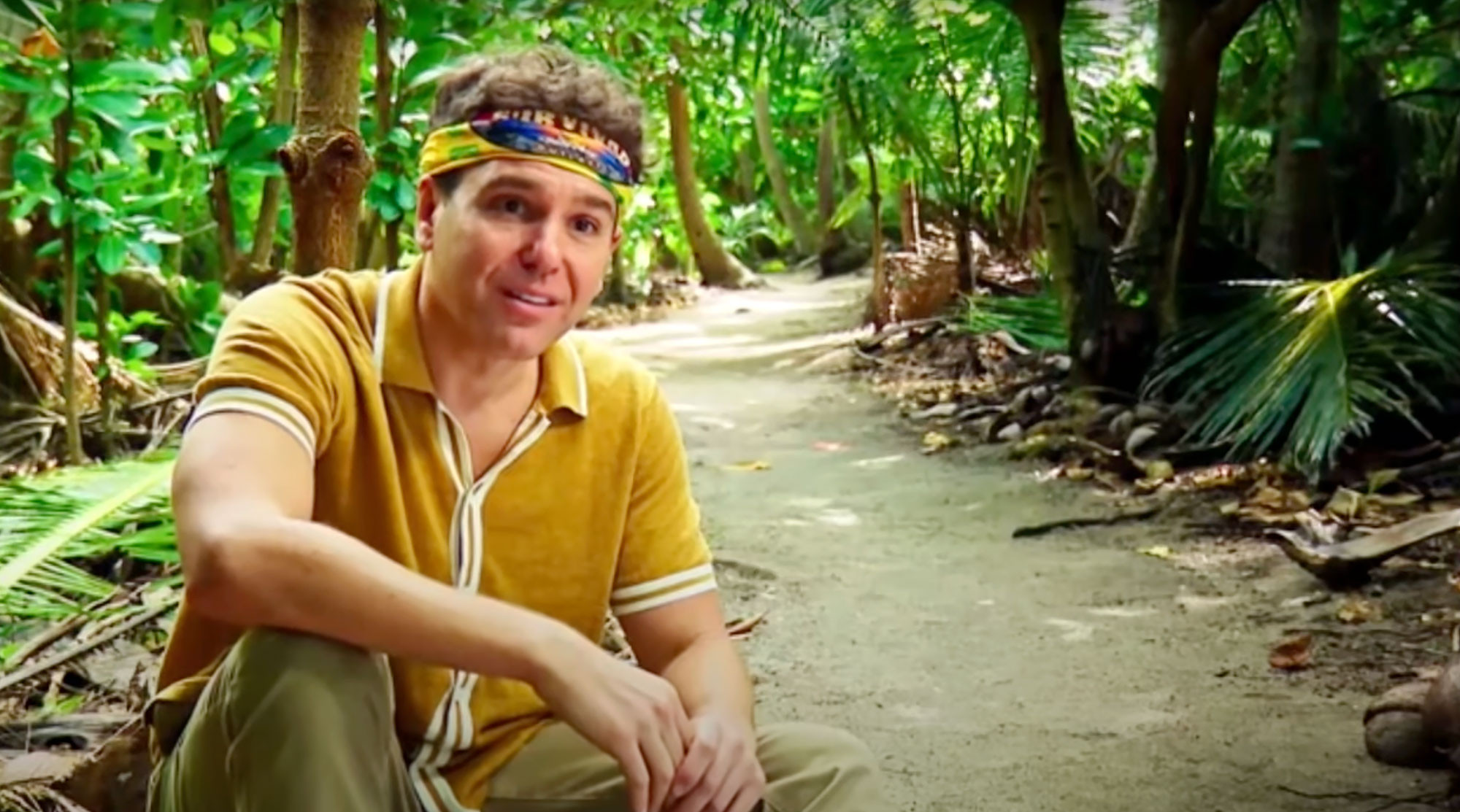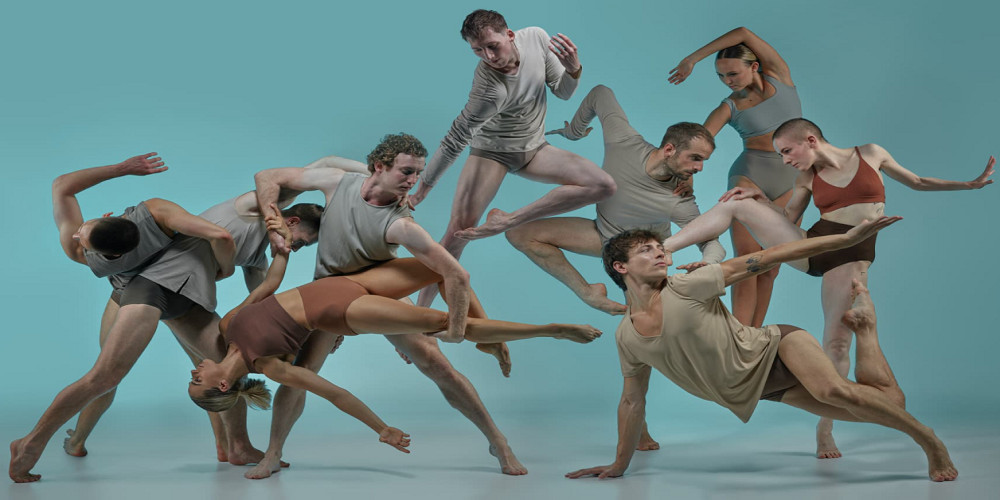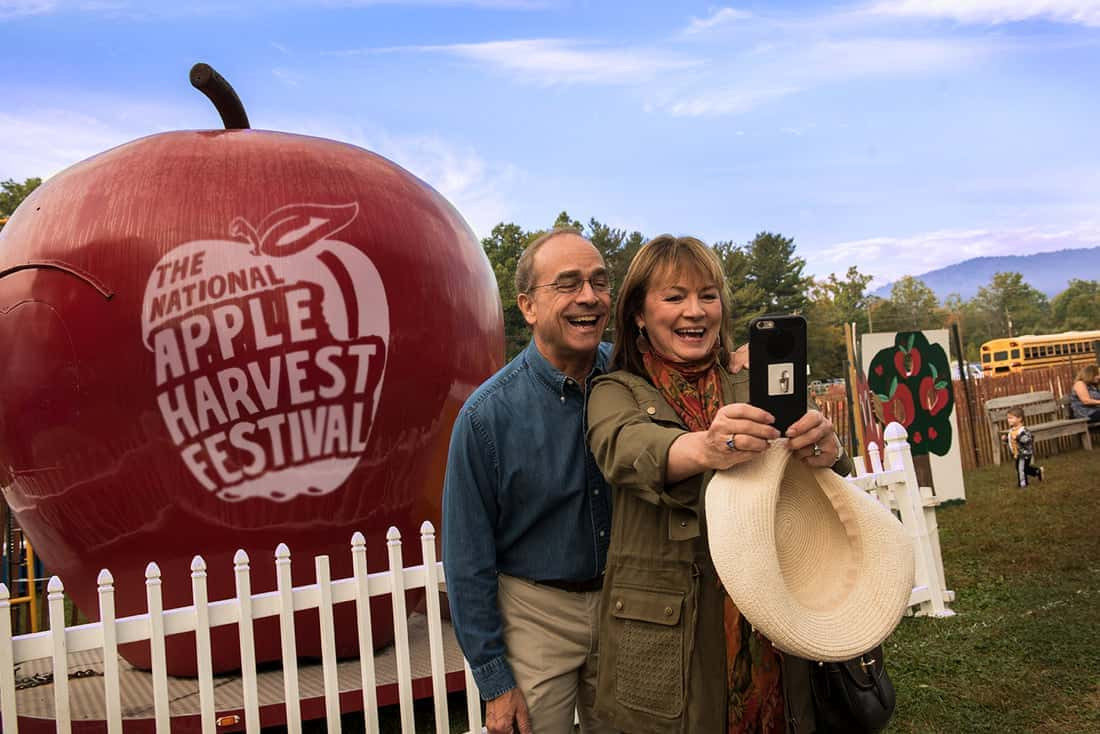Kristen Bell and Adam Brody in a romantic comedy? Everybody wants this, especially millennial women who, approximately two decades ago, found a feminist avatar in Bell’s performance as Veronica Mars’ titular teen detective and an ideal crush object in Brody’s portrayal of the sensitive Seth Cohen on the quintessential mid-aughts teen soap, The O.C. Both actors are charming—while she excels at screwball banter, he radiates laid-back confidence—and their onscreen chemistry could make even the most poorly executed rom-com worth watching.
In that regard, Nobody Wants This, whose 10-episode first season is streaming on Netflix, turned out better than it needed to be. The angle is interfaith romance. A blonde agnostic of Christian descent, Bell’s Joanne has a chaotic dating life and overshares about it in a raunchy podcast à la Call Her Daddy. When she meets “hot rabbi” Noah (Brody) at a dinner party, he has just broken it off with a longtime girlfriend (Emily Arlook’s Rebecca) who got so impatient for him to propose, she simply hunted down the engagement ring he was saving until he was certain he wanted to marry her and put it on her own finger. A will-they-won’t-they ensues—one that, while breezily watchable, feels short on insight into the realities of Jewish-gentile relationships in the 21st century, despite taking inspiration from creator Erin Foster’s courtship with her Jewish husband.
The series takes pains to establish that although they are upper-middle-class white people of roughly the same age with families based in Los Angeles, its leads come from disparate worlds. Joanne is, in a word, messy. Jaded, unfiltered, and prone to swiping right on the worst guys available, she’s the ideal co-host for the fast-rising chat show, also titled Nobody Wants This, that she makes with her younger sister, Morgan (Justine Lupe, a.k.a. Succession’s Willa). Ever since the girls’ dad (Michael Hitchcock) came out as gay, their parents have been separated but also inseparable, in part because their flighty mom (Stephanie Faracy) is still in love with him.
Noah lives the quieter life you might expect of a spiritual leader—though he also smokes weed and engages in casual sex and does other things of which his aging boss, Rabbi Cohen (Stephen Tobolowsky), would not approve. His parents, Bina (Tovah Feldshuh) and Ilan (Paul Ben-Victor), are Eastern European immigrants with a self-made fortune and the stiff demeanor of characters at least a generation older; Bina is so repressed, she can’t even say the word sex. Noah’s obnoxious yet loyal older brother Sasha (the hilarious Veep alum Timothy Simons) is married to Rebecca’s ball-busting best friend, Esther (Jackie Tohn from GLOW), which makes the couple just one obstacle standing in the way of Joanne and Noah’s happily ever after.
But the real problem, for Joanne, is that she’s an outsider among the unfeasibly insular Jewish community that has until now dominated his life. Parents at shul, looking to set up their adult daughters with the rabbi, are scandalized to see the shiksa he’s dating at a service. Rabbi Cohen warns him that if he wants the big promotion he’s up for, he’ll have to give up that “nice blonde crab cake” he’s dating. This is all believable enough within the context of Noah’s vocation. What feels less realistic, considering how cool and easygoing he’s supposed to be, is the homogeneity of his personal life. All of his friends seem to be Jewish couples who are loyal to Rebecca. He and Sasha play on a recreational basketball team called the Matzah Ballers.
There’s a fine line between exploring Jewish identity and essentializing it, and Foster (who converted) sometimes crosses into dubious territory. Noah’s ruminations on theology and tradition can be lovely, and they feel true to his pensive character. But when Esther sends Sasha to the schvitz, where his dad spends all day every Sunday, to request a promotion at the family company, so that she can print his impressive new title on their daughter’s bat mitzvah announcement? It starts to seem as though nothing ever happens with Noah or his family that isn’t explicitly about being Jewish. Meanwhile, unlike just about any real person of her generation raised in a major metropolis, Joanne has never so much as heard the word shalom.
As the season progresses, it becomes more and more palpable that Nobody Wants This is contorting reality to lend stakes to the question of whether Joanne and Noah can make it work. (In my elder-millennial experience, interfaith couples are more common than not. I’m in one. It is the opposite of a big deal.) In doing so, the series engages in some unfortunate stereotypes. The Jewish men we meet are henpecked to the max, and their wives have the sharpest of beaks—not to mention a deep-seated loathing for the delicate-featured shiksas these guys can’t help gawking at. Do we really need a B-plot where Morgan and Sasha surreptitiously flirt?
And yet, for all its absurdity, Nobody Wants This is almost always a pleasure to watch. The dialogue is quippy without being overwritten. When Esther tells Joanne she’s been writing mean reviews of her podcast, Joanne chirps, “Every review is an engagement, so thank you.” When Joanne tells her family she’s considering whether to convert to Judaism, her father exclaims “That’s fun!” as though she’s contemplating a girls’ trip. Her pal Ryann (D’Arcy Carden) weighs in on the same dilemma: “Just… be Jewish. It’s not like you stand for things.” An especially fun episode takes the couple to a Jewish summer camp, where the teen girls all have crushes on Noah.
It doesn’t hurt that the cast is so likable. Comedy stalwarts like Carden, Simons, Tohn, Faracy, Tobolowsky, and Sherry Cola (Joy Ride, Good Trouble), the raspy-voiced scene stealer who plays the mutual friend who brings Noah and Joanne together, keep the mood light. Feldshuh’s Bina, in all her delusional narcissism, has an unlikely charisma. Lupe makes an excellent foil for Bell, their fractious bond deepened by decades of sibling rivalry and the threat Joanne’s new relationship with a decent guy poses to a podcast dependent on her dating woes. And even if the whole opposites-attract setup can read as artificial, the warmth between Bell and Brody feels exhilaratingly real. You just want to see them banter and kiss and snuggle and thrive. Implausible as it can be in terms of interfaith representation, through sheer chemistry and chutzpah, Nobody Wants This earns enough goodwill to merit another attempt in Season 2.
The Show's 'Specificity' Is Its Biggest Flaw
For many viewers, Netflix’s Nobody Wants This will be enjoyable simply as the very conventional, frequently likable rom-com that it is. Sure, it’s extremely sitcom-y at every turn, but stars Kristen Bell and Adam Brody have an easy, instantly combustible chemistry that says, “In 2004 we were every smart TV fan’s favorite pair of snarky high schoolers and now, 20 years later, we’re ready to be treated like grown-ups and for everybody to remark upon how well we’ve aged.” Bell and Brody are accompanied by a supporting cast of veteran scene stealers, and creator Erin Foster has additionally given their tale a specificity that sets it apart from your average meet-cute about mismatched lovers. However, specificity, as critics have pointed out, comes with its own set of responsibilities. As a rom-com, Nobody Wants This leans heavily into Jewish stereotypes and doesn't shy away from using them as comedic fodder.
The Jewishness Is More Than Just a Plot Device
As much as I’m inclined and predisposed to like any comedy in which the male romantic lead calls a love match “bashert,” in which celebrating the rituals of havdalah is treated like foreplay, in which gefilte fish jokes abound, Nobody Wants This leans as heavily into stereotypes as it does sitcom tropes. Occasionally it upends those pieces of too-familiar representation, but it just as frequently doesn’t. While the series, which took admirable effort to cast Jewish actors in most of its key Jewish roles, never really becomes antisemitic itself, it definitely excuses shades of antisemitism as amusing character quirks.
Based to some degree on Foster’s real-life experiences — not the ones involving suddenly having Katharine McPhee as your stepmother — the rom-com features Bell as Joanne, who alternates between going out on disastrous first dates and recounting those disastrous first dates to her sister Morgan (Justine Lupe) on their podcast, Nobody Wants This. (It’s a bad title for a podcast and a bad title for a TV series.) Those unfortunate outings are the key to the success of their show, which Joanne insists is about empowerment, but everybody else thinks is mostly about sex.
Nothing is worse for the podcast, then, than Joanne falling in love. But she does just that when she meets Noah (Brody). He’s fresh off his near-engagement to Rebecca (Emily Arlook), having realized that the relationship was what she wanted and what his family wanted and what everybody expected of him, but not what he actually desired.
Noah is witty and self-effacing and generally hunky and definitely not like any man Joanne has dated before, because he’s also a rabbi. But nothing is worse for a rabbi than falling in love with a shiksa, and Joanne is definitely that.
“Technically, it’s a Yiddish insult that means you’re impure and detestable, but these days it just means you’re a hot, blonde non-Jew,” Noah explains to Joanne.
“That’s actually a perfect description of me,” replies Joanne, who has no real spiritual system of her own and, despite living in Los Angeles, an obliviousness toward all things Jewish that is rather impressive.
Noah is a junior rabbi at what looks to be a fairly reform congregation. The senior position is in his grasp, but dating a non-Jew could be a hindrance. At least, it seems like it’s going to be an issue for his family, including his immigrant parents Bina (Tovah Feldshuh) and Ilan (Paul Ben-Victor). Noah’s goofy younger brother Sasha (Timothy Simons) has no objections, but Sasha’s wife Esther (Jackie Tohn), one of Rebecca’s best friends, has enough resentment for the both of them.
The Show's Overreliance on Stereotypes
Structurally, Nobody Wants This doesn’t do anything special. There were more than a few times when I wrote, “Are they really doing THIS tired plot?” True, being on Netflix allows a detour into a sex toy shop to be more graphic than if it were on, say, CBS. But flimsy farce is flimsy farce, and this show is content to be that with some regularity. Expect lots of too-predictable misunderstandings and miscommunications.
First weekend getaway goes astray? Check! Female lead gets the questionable advice that she needs to play harder to get and not throw herself at the man she’s beginning to love? Check! First meetings with various family members go embarrassingly wrong? Double check! The dialogue has a nice crackle and there are some semi-fresh ideas — I liked “The Ick,” to refer to that moment a new love does something small but odd that permanently alters the way you see them. But this is generally a much more conventional take than recent revisionist love stories like You’re the Worst or Colin from Accounts.
It’s the Jewish thing that gives Nobody Wants This its edge, and I could happily go through the myriad things the show does right, from an episode set at a Jewish summer camp to various tossed-off punchlines and details about religious underpinnings. When it comes to the stereotyping, there’s good-natured mockery of Noah’s basketball team, the Matzah Ballers, and his interactions with his boss (the always great Stephen Tobolowsky).
But there’s much less warmth to the treatment of Bina, who remains stuck in a single note that I’m afraid Feldshuh has played far too many times. Nobody is going to say that the “Jewish boys and their co-dependent relationships with their mothers” cliché is without some occasional truth, but it’s disheartening to have it treated this on the nose in 2024, and in such predictable contrast to the affection the series has for Ben-Victor’s Ilan.
The way that Jewishness plays as an impediment for this couple is, again, something that absolutely has a basis in some reality and specifically in Foster’s reality. After enough similar misadventures, though, the they cease to feel like one person’s actual experiences and more like the accumulated experiences of a writers room.
The biggest victim of this excess is Joanne, whose general cluelessness about all things Jewish goes from seeming likably isolated to willfully ignorant in a hurry. As in, if you’re a podcast host dating a rabbi and he has taken the time to listen to your sex podcast, but you apparently haven’t so much as googled “What does a rabbi do?” the appeal is diminished. It’s one thing for her not to know what “shalom” means, and another for her not to know what “shabbat” is (one week after having, in the pilot, attended a Shabbat service at his temple). Or to bring a beautifully curated charcuterie plate to a family gathering, several weeks or maybe months into the relationship, without stopping to ask, “Is any of this pork?”
But all of those things? Maybe he’s not trying as much as he should either, but in all this time, how could she not have streamed Fiddler on the Roof out of basic curiosity? Were this disinterest a clear characterization choice, I might be OK with it, but it’s not.
Morgan might be worse, actually. While Joanne is probably just unaware on the page, Morgan may be actively antisemitic, delivering jokes about how Jews tend to look and having sex through sheets. Because Lupe is just ridiculously funny — especially for anybody making the contrast to her much more Jew-curious character in The Marvelous Mrs. Maisel — and because she and Bell have great, cutting rapport, I laughed at some of these lines, but I never stopped feeling like there was a lot of charm-washing going on. Cast actresses 10 percent less endearing than Bell and Lupe and I’m pretty confident that Joanne and Morgan come across as bad people.
The Show's Saving Grace?
This goes both ways, mind you. One or two jokes about Joanne being a shiksa? Amusing and real! Ten or 15 jokes about Joanne being a shiksa? At that point, it’s a reminder that “shiksa” is, indeed, a slur and bullying is very rarely, in and of itself, funny. Do better by digging deeper!
But if you don’t dig deeper, you can just look at this as a love story in which one participant is sure of who they are and who they want to be and the other remains a work in progress. Simple, but reliable stuff. Stripped of caring about the specificity, you can just relish watching Brody and Bell flirt for 10 half-hour episodes, which they do delightfully. The back-and-forth between Sasha and Morgan, especially once they realize that they’re each the “loser sibling” in their respective families, is a reliable source of laughs as well — though the narrative rushes to put the characters into what I’ll only suggest should have been a season three or four position. As stealth MVPs go, Shiloh Bearman stands out because her character, Sasha and Esther’s bat mitzvah-aged daughter, has separate scenes with Joanne, Sasha and Esther that humanize each character.
I wish the series could have gotten more use out of Sherry Cola as Joanne and Morgan’s podcasting colleague, both because of how hilarious Cola was in Joy Ride and because the podcasting part of the story is really, really thin.
That plotline is just one of many places Nobody Wants This has room to grow in a second season that I’d still love to see, despite my reservations. In response to the show’s title, it isn’t that I don’t want this. I actually want this badly. But to reference a complete unconnected rom-com … it’s complicated.
A Show That Could Have Been Better
The conventional wisdom about romantic comedy on TV is that, for the most part, it doesn’t belong there. Maybe weaving a prominent will-they-or-won’t-they subplot into a sitcom can give viewers the warm-blanket feelings of The Philadelphia Story or You’ve Got Mail. But shows designed primarily as romantic comedies have been so ill-fated that they seem to work best when chronicling particularly toxic or unconventional attempts at coupling, as seen in Netflix’s Love or You’re the Worst.
At the same time, the creative successes of those shows illustrate just what TV rom-coms can be good for: dissecting the developments that follow the traditional happily-ever-afters of their movie counterparts. The spark of perpetual romance may be difficult on TV, but digging into ongoing relationships is the format's specialty.
Nobody Wants This feels like an attempt to craft a lighter, less bracing version of shows like Love or, especially, You’re the Worst; its title even sounds like an off-brand knockoff of the latter. Premiering Sept. 26 on Netflix, it’s a rom-com of seemingly mismatched partners: sincere, confident rabbi Noah (Adam Brody) and sardonic, extremely non-religious podcaster Joanne (Kristen Bell). Noah has just ended a long-term relationship after realizing that he was coasting toward marriage on autopilot; Joanne has rejected countless suitors before even giving them a real chance, preferring to turn them into fodder for the podcast she co-hosts with her sister Morgan (Justine Lupe).
The way that Nobody Wants This presents its podcast—comfy couch recording sessions, constant sisterly banter, a kind of affected “who, us?” anti-professionalism—feels similar to the usual movie versions of this stuff, which tend to rely on studio-style setups where the characters look more like professional DJs. The casual vibe is a mixed blessing. It more accurately reflects how many shows start out homemade; it also generates suspicion that the show-within-the-show is shoddily built up from someone’s rambling, self-amused hobby.
Technically speaking, there isn’t a real-life Nobody Wants This (that’s the name of the podcast in the show, too)—nothing touted in the press releases or cited in the credits as source material. But series creator Erin Foster does host a show with her sister called The World’s First Podcast.
The sisters also made the short-lived VH1 reality-show spoof Barely Famous, and Foster has sitcom experience from a staff job at a Ryan Murphy show from a decade ago. In spite of those credits, Nobody Wants This feels very much like it was created by a podcaster, for Netflix—uniting two popular formats under their shared goal of stringing stories out shamelessly.
One episode takes place entirely in the aftermath of the couple’s first kiss, as Joanne nervously waits for a return text and Noah gets distracted by a problem with his ex. In another episode, they run an errand together and must survive a mild embarrassment. A show like Seinfeld could surely spin this stuff into 22 hilarious minutes, but Nobody Wants This never even hints at a Seinfeld-like command of wacky minutiae.
Instead, it turns its attention to the pointless mastery of canned banter and stock phrases—the podcast-y sounds (“I like that for you,” “I don’t hate that”) of people who have heard funny dialogue before but can only recreate the tone of it, not the actual jokes. Weirder still, the central conflict that eventually emerges between Noah and Joanne is a potentially weighty one having to do with religious and social mores, which throws the nothingness of the show’s comedy further out of balance.
The way Nobody Wants This fumbles through the streaming-era process of actually producing workable episodes is especially strange given how much talent it draws from touchstones of 2000s TV: Bell and Brody both came up in distinctive teen dramedies, while one of the staff writers has the unbeatable resume of Futurama, Arrested Development, and 30 Rock. There’s more: Episode directors include comic pros like Greg Mottola (Superbad) and Karen Maine (the more recent Yes, God, Yes), while Veep’s Timothy Simons has a major supporting role as Noah’s sibling (though they seem much more like bros than actual brothers). This is pretty close to an all-star production.
The real question is why all these stars, on both sides of the camera, agreed to do this show in the first place; it seems like a lot of work just to approximate a cutesier version of You’re the Worst. Nobody Wants This benefits from that work, to be sure. Bell and Brody, in particular, are easy to watch and could have starred in a perfectly decent 90-minute formula rom-com with no sweat. But that doesn’t make this show better so much as it makes clear that, with less likable stars, it could have been even worse. Nobody Wants This seems to think that it’s exploring the complex ins and outs of a modern relationship; really, it’s a lot of well-off people making wan jokes while gazing at their navels.




